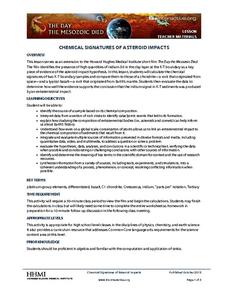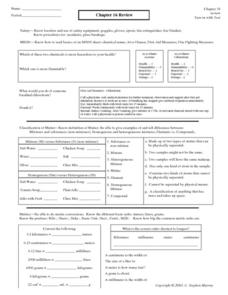Curated OER
Bond Type
At the top of the page are a reading passage and colorful diagram that depicts the tug-of-war that occurs between bonding molecules due to electronegativity. High school chemists fill in a chart with electronegativity values, the...
Curated OER
Chapter 19 Review, Mixed Review: Oxidation-Reduction Reactions
Here is a short, but well-rounded review of redox reactions. Chemistry apprentices identify the type of reaction, write half-reaction equations, balance equations, and assign oxidation numbers. Being brief, this would make a purposeful...
Curated OER
Grossmont College - Chem 115 Practice Exam 2
Here is a straightforward practice test for first year chemistry learners. Responders balance equations, identify types of reactions, represent electron configurations, and solve stoichiometry problems. Keep this handy to use as...
Royal Society of Chemistry
Born-Haber Cycle: NaCl
Max Born and Fritz Haber developed the Born-Haber cycle in 1916, which is used for measuring enthalpy that otherwise couldn't be measured. Young scientists solve four matching puzzles using their knowledge of the stages, standard...
Curated OER
Solution Chemistry Investigation
Students engage in a lesson that is concerned with the concepts related to solution chemistry. They calculate the molar mass of various chemical compounds. Then students predict the anion ratio for ionic compounds. Students also write...
Curated OER
Balancing Equations
In this chemical equations learning exercise, students review the steps to balancing equations and then complete a graphic organizer by balancing 10 chemical reactions.
Curated OER
What is Everything Made of?
Students observe a demonstration on how we see space between water molecules. In this experimental lesson plan students discover what elements make up the things around them and discuss what they learned.
Curated OER
Ionic and Covalent Bonds
Ionic and covalent bonds are the focus of this chemistry activity, which provides learners with eighteen key terms to use in a fill-in-the-blank activity. Additionally, students are prompted to write the number of atoms in four given...
Science Geek
Atomic Structure
The International Union of Pure and Applied Chemistry (IUPAC) was formed in 1919 and was crucial for allowing scientists to discuss findings during the Cold War. A presentation offers an introduction to atomic structure including the...
University of Georgia
Bag O' Isotopes
Accommodate your chemistry class with an experiment that is both entertaining and educational. Through the activity, blossoming chemists perform calculations on various isotopes, as represented by beans and legumes, to obtain the average...
Howard Hughes Medical Institute
Chemical Signatures of Asteroid Impacts
What killed the dinosaurs and how do scientists know? Your high schoolers can examine these fascinating questions with a geochemical lens using the engaging 33-minute video, the accompanying data interpretation, and some thoughtful...
Curated OER
Balancing Equations
In this chemical equations worksheet, students review the rules in balancing equations and then balance 11 chemical reactions.
Curated OER
Matter: All That "Stuff"
In this chemistry worksheet, students learn about matter, including atoms, electrons, protons, neutrons, compounds and chemical properties. They use this information to answer the 10 questions on the worksheet. The answers are on the...
Curated OER
Doing Lewis Dot Diagrams
Students observe the periodic table and draw the Lewis Dot Diagram. In this investigative lesson students construct information on several elements including the Lewis Dot Formation and take a quiz on the information they learned.
Curated OER
Chemistry
In this chemistry worksheet, students describe an atom, its parts, the charges of these parts, and atoms life functions. Then they explain what the octet rule states for the placements of electrons around the nucleus of an atom. Students...
Curated OER
Chemistry Scavenger Hunt
In this chemistry worksheet, students identify the three main phases of matter. Then they search for information about each element on a Chem Time Clock. Students use the chemical symbol to identify each element.
Curated OER
Natural Resources
In this natural resources worksheet, students compare examples of chemical and physical properties, balance equations, and calculate molar mass and moles. This worksheet has 12 problems to solve and 12 short answer questions.
Curated OER
Working Out Empirical Formulae
In this chemical compounds worksheet, learners learn the steps for determining the empirical formula of a compound and then complete 3 problems.
Curated OER
Moles
For this moles worksheet, students determine the mole ratio in given compounds and calculate the number of moles of specific elements in chemical compounds. This worksheet has 19 problems to solve.
Curated OER
Unit 5- Oxidation Reduction
In this oxidation reduction worksheet, students read the notes provided about the different types of chemical reactions. Students identify the reactants and products and answer fill in the blank and short answer questions.
Curated OER
Classification of Changes
In this classification of changes worksheet, students identify each example as either chemical or physical changes. Students also classify other examples as either element, compound, solution, colloid, or suspensions. In the other...
Curated OER
Periodic Table Lesson Plan
Students describe how elements are arranged on the periodic table. They compare metals, nonmetals, and metalloids based on their properties and on their locations in the periodic table. Students describe the differences between a...
Curated OER
Chapter 16 Review- General Science
For this review of general science worksheet, students classify examples of matter as mixtures or substances, homogeneous or heterogeneous mixtures, or elements or compounds. Students also convert several examples using the standard...
Curated OER
Bouncing Balls
Students create a polymer ball in the lab. In this chemistry lesson, students identify the different properties of the polymer they created. They explain what type of chemical reaction took place.

























